Covering the CAA-NRC Panel Discussion
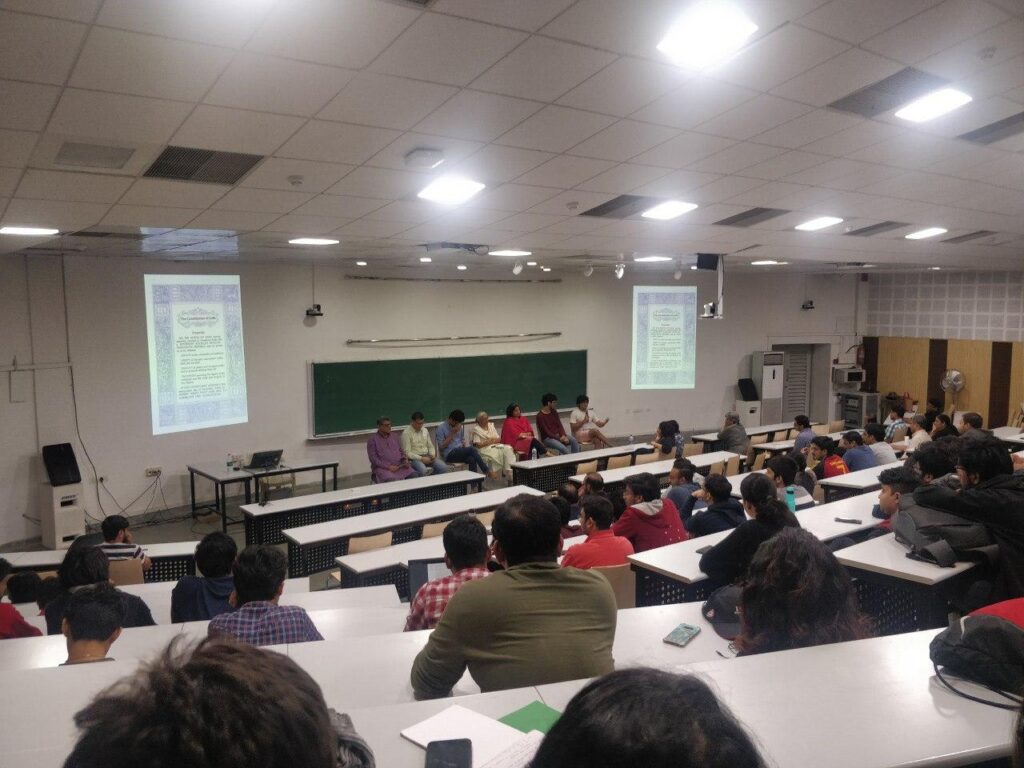
On the 9th of January, a student-faculty panel discussion was held in view of the ongoing Citizenship Amendment Act (CAA) and National Register of Citizens (NRC) debate. In this piece, we attempt to summarise the discussion that ensued. We highlight the major points covered by all the panellists, the audience, and responses to each.
A panel was formed, moderated by Prof. Jayanthi Sivaswamy and consisting of six speakers: three faculty members and three students. Prof. Sivaswamy opened the discussion and elucidated incontrovertibly that all opinions expressed by the panellists were made in their individual capacities, not representing the Institute in any manner.
Notable here is that none of the six panellists spoke in favour of the Act(s). When this was raised by the audience, the moderator said she would be more than happy to moderate another session with more representation from the other side of the debate. On the matter of diverse representation of views, a Member of Student Parliament said on the Facebook group Life@IIIT-H that none of the panellists were asked for their view on the topic before they went on the panel.
Speaking for around five minutes each, all the panellists expressed their views against the Act and the proposed registers. Prof. Aniket Alam spoke on the concept of Ethnic vs Civic Nationalism, and India as a Nation-State following Civic principles. Minesh Mathew chose to examine the situation through the eyes of the ideology of the Sangh Parivar. Focusing on the fundamental right to freedom, Prof. Kavita Vemuri elaborated on the unconstitutional nature of both the CAA and the NRC, as they eliminated on the basis of religious identity. She also spoke of the similar restrictions placed on personal privacy in the soon to be introduced Data Privacy Bill.
Speaking about how the CAA is anti-secular as well as against our cultural values, Rohan Grover spoke on how the exclusion of Muslims and others was promoting the xenophobic narrative. Prof. Abhijit Mitra chose to focus on the NRC – talking of its impact, particularly on those who live by ‘unorganised knowledge’ – the knowledge that resides in the people. In general, he raised the concern that, with the proposed NRC-NPR documentation, India was headed towards an Orwellian dystopia a la 1984. In his words, Demonetization, GST, and now CAA-NRC-NPR are all stages in this scheme. Tanmai Khanna spoke of the protests. He referred to the government’s response to them as telling of ulterior motives.
The audience were given a minute each to speak, albeit some took in excess of five minutes. This was where the first support for the government’s actions came – about a tenth of the audience appeared to cheer for such stances. Arguments for the CAA and NRC came in four large buckets – that ‘Socialist and Secular’ were not in the Preamble at the time of Independence, that discrimination already existed in the form of Affirmative Action and Reservations (especially for minorities), that the BJP’s motivations were being misrepresented, and that Islamic faith was directly in opposition with loyalty to the Indian state. Both the audience and panellists interacted. The discussion ended with all panellists summing up their thoughts in over a minute each.
Below, we present a paraphrasing of the panel discussion. While the speakers’ comments have not been taken verbatim, we try to convey the entirety of their meaning.
Contents
India as a Civic Nation-state over an Ethnic One
Examining the Issue through the Perspective of the Sangh Parivar
An Unconstitutional Affair, and the Vitality of Freedom
The Exclusion of Muslims from the CAA as Promotion of Xenophobia
Disenfranchisement of the Citizens by the Government
The Protests and the Problems with CAA-NRC
Arguments in Favour of the Government’s Actions
Responding with the Fallacy of Generalising the Actions of Individuals to Groups
Religion and the Effects on the Middle Class
On the Partiality of the Panel
Protests as a Reaction to the Context, rather than just the Acts
Regarding the Role of the Students
Who does the Constitution Apply to?
Extremism, and a Deviation from the Topic
The Chronology of CAA-NRC, and Why it is Important
General Comments on the Topic:
The System is not Based on Trust, but in an Inherent Mistrust
Responding to Questions Asked during the Proceedings
Looking Back to the 1930s to Learn from the Past
The Idea of Schrödinger’s Immigrant
A Solution to the Problem: Work Permits
Panelists Open
Opening Remarks
Prof. Sivaswamy opened the discussion, exclaiming that she was both “shocked and surprised” to see the response and interest shown by the students, evident from the number of students that were in attendance. Attendees were advised to keep their emotions in check to avoid conflict and that the point of the discussion was to raise awareness, not divide the community. panellists were to be given five minutes of speaking time each, and audience members a minute.
India as a Civic Nation-state over an Ethnic One
The first panellist, Prof. Alam, focused his speech on the two types of nation-states in the modern world, based on whether the state follows the principles of Ethnic or Civic nationalism. Ethnic nationalism defines citizenship based on the ethnicity of the general population (such as China, Japan, Israel) while States following the Civic principles accept anyone who agrees to abide by the rules of the constitution – USA and France as examples.
He referred to The Preamble of the Indian constitution that states “We (the people of India)… adopt, enact and give to ourselves this Constitution”. When India became independent both civic and ethnic principles existed, although Civic Nation-states were in the minority. India, however, elected to choose a Civic national model and has over the years lived up to this ideal. The panellist believed that the CAA would eradicate this civic nationalism that India has till date lived up to – placing religious limitations on what was earlier a secular, civic process.
Examining the Issue through the Perspective of the Sangh Parivar
Minesh Mathew focused on the issue through the ideological perspective of the ruling party. He talked about Amit Shah, an integral part of the ruling party who has two pictures in his office – Chanakya, an ancient Indian philosopher and advisor to the king, and Vinayak Damodar Savarkar (‘Veer Savarkar’), an independence activist who was jailed in the Cellular Jail in Andaman and later pledged his allegiance to the British. He was also an accused in the Gandhi murder case, albeit later acquitted. Minesh raised the point that although many activists had been imprisoned in the cellular jail, the RSS and the ruling party chose to revere him and named the airport at the Andaman after him 1. Savarkar was instrumental in laying the foundations of Hindutva in India and was very open about his hate towards Muslims. In an account by him he claimed to have as a child “vandalized [a] mosque to our heart’s content…” and “danced with joy” on hearing of the killings of Muslims by Hindus in the riots that followed 2 3.
Minesh pointed out that the Rashtriya Swayamsevak Sangh was not in favour of our national flag and felt that it would never be respected by the Hindus. He spoke about RSS being unhappy that Manumriti was not a basis for our Constitution 4. M.S. Govalkar, the second chief of the RSS had stated that Nazi Germany was the highest manifestation of national pride 5. He also considered Muslims 6 and Christians as internal threats. He concluded by saying that the Citizenship Amendment Act would exclude only one major community and the reason for this was rooted in the political ideology of the ruling party and the RSS.
An Unconstitutional Affair, and the Vitality of Freedom
Having stated that she would be going to take a more abstract approach, Prof. Vemuri stated that it was interesting that the current government had forgotten the Constitution and was going against its principles – for it is the Constitution that allows for the government to exist at all. India has always embraced different thoughts and there is no such thing as a ‘native Indian’. She was appalled at how the government is going after fundamental principles, that were taking away her freedom of what she wants to be. The panellist believed that the fight against the CAA is because of how the Act identifies people by their caste and religion; and that while it might be against one religion today, others might be targeted tomorrow.
Looking at the legal side of things, the Citizenship Act of 1955 did not mention religion and in many countries such as Sri Lanka and the US, religion is considered very personal and not mentioned in any of their laws. She said that the primary danger of the CAA lay in the ordering: the CAA first, and then the NRC; allowing the government to get people’s details, and then classifying people as citizens or not based on that information. There would be no end to this once the Act started getting implemented, and tomorrow it could be some other community. The panellist was also happy to see the younger generation stand up for the constitution and not just treat it like a piece of paper.
Prof. Vemuri was also of the opinion that the protests should not be violent. She asked people to look back at the first Civil Disobedience and take note, protesting without violence – for by being violent, protesters would be doing exactly what they (‘they’ referring to abstract people in power, not any specific government) wanted.
The panellist asked the audience to keep a close look on the Data Privacy Act, an Act that would give the government the power to take any information from any private agency. Acts like these, in her opinion, were slowly turning India into a police state. The speaker mentioned that it was sad that we, the people, were protecting the constitution from its protectors (the government). Another point raised was that no person was born into a religion, and hence using religion as the basis for identification was unfortunate.
Prof. Sivaswamy highlighted the panellist’s comment on religion, and wondered what would happen to people from other countries that were non-religious. She also spoke about how even though the government gets rights from the constitution, even the constitution had to be amended at times, such as the inclusion of LGBTQ+ rights. Her opinion was that the Constitution was no holy book, and it was rather about what was ethical and what was right.
The Exclusion of Muslims from the CAA as Promotion of Xenophobia
Rohan Grover reiterated the fact that India is the largest democracy in the world. However, the CAA-NRC were causing the decay of these democratic values. Secularism requires being open to all, but many communities were being excluded in India by the Act, such as Sri Lankan Tamils, Jews, Muslims. He went on to say that the CAA was in opposition to values of democracy as the government was denying citizenship on the basis of religion. The NRC, on the other hand, affected persecuted minorities and people coming from other countries. Rohan criticised the detention camps by drawing parallels with Nazi Germany. Any individual who had no place to stay had always had India as an option of safe haven (as Indian values have always been about welcoming others with open arms, not turning them away), and it should remain that way.
Prof. Sivaswamy also emphasised that Hinduism was always accepting and absorbing of other cultures and that this xenophobia was really unfortunate.
Disenfranchisement of the Citizens by the Government
Prof. Mitra started off by saying that the CAA was anti-constitutional, but the NRC was both worse and scarier. He urged everyone to think from the perspective of the government to get a better understanding of the idea and then proceeded to talk about the history of the NRC. The first NRC was in 1951; later in 1979, there was an anti-foreign movement in Assam, led by AASU (All Assam Students Union) – here, he pointed out that students always had a major role in the movement – which led to the 1985 Assam Accord i. Incidentally, this was not the NDA that did this but the state.
The first (updated) NRC draft, however, was only recently mandated by the Supreme Court in December 2017, with the second draft in August 2018. Initially, there were forty-one lakh immigrants listed in it, but the demand at the time was to disenfranchise those that were in the list. In a further reduction, the list went down to nineteen lakh. The CAA that came after had opposition, while the NRC had both opposition and support, in part due to the different situation in Assam from the rest of India. In his words, every State has its own way of getting to 1984 7. ii
Prof. Mitra went on to speak about the people who were going to suffer. The people who would be affected the most were the Muslims, Adivasis, and Backward and Scheduled Castes. These groups of people organize their lives and contribute to society on the basis of unorganized knowledge. The panellist believed that there was an overall attempt by the government to marginalise and disempower these people. It would also mean the nullification of advantages such as universal suffrage, gained during their anti-imperialist struggles in the 20th century. The NRC was initially implemented in Assam and subsequently, the CAA was passed to cover it. However, with the CAA and NRC imposed across the country, there were now open threats to implementation. Protests to this accord were faced with increasing instances of police brutality. In general, one could observe an overall attempt by the government to marginalise and disempower those that live by organised knowledge which would disenfranchise all the efforts of the 20th century against the NRC.
He also gave a backhanded compliment to the Government’s attempt to divide people through CAA-NRC, by noting that they have actually succeeded in uniting them like never before. He also cautioned the audience to understand the real issues involved and to not get entrapped into diversionary narratives such as Left vs Right and Communal vs Secular.
Prof. Sivaswamy added that many people, especially those in the weaker sections of society would fall victim to corruption by government officials and this would be the exact opposite of the agenda the government had, i.e., to eradicate corruption.
The Protests and the Problems with CAA–NRC
Tanmai Khanna was surprised that the protests and their outcomes were not focused on, in the speeches of the preceding panellists. He believed that the protests and the response to them were linked as the government’s response to the people expressing their views made the intentions of the government vivid. The BJP and its supporters listed anyone that goes against the government as anti-nationalist. The incident in JNU was not about the protests, but about this wrongful identification.
Tanmai felt that sentiment that the CAA was problematic when linked with the NRC was true, however, the CAA was problematic in itself. This was the first time that the government had expressed itself against a certain community and it had given no reason as to why only certain communities were excluded. Another interesting point raised was how an individual would be classified as belonging to a certain religion. There is no foolproof method to check a person’s religion. This might get worse as this judgement was to be left to the discretion of the local government officials. The reason why people felt so strongly about this Act was because it hinted at larger ramifications. The famous post-war poem “First they came …” by Martin Niemöller was recited 8, and the audience was asked not to remain apolitical as it affected all of us.
Audience Speaks
Arguments in Favour of the Government’s Actions
Audience 1’s first request was for an exception to the time rule as the whole panel was against the CAA. The speaker stated that the preamble had flaws. The words ‘Socialist and Secular’ were added to the preamble by Indira Gandhi when the opposition was in jail during a state of emergency in the country. The reason that the founding fathers of our nation did not want these words in the constitution was that if they existed, the government would not be able to give affirmative action to minorities.
The speaker also felt that the CAA and NRC were democratic, mentioning how the Lautenberg amendment of 1989 allowed entry to Jews and Evangelical Christians in the US 15 16. Democratic countries like Switzerland and Norway also maintain an NRC. Legality and constitutionality not being threatened due to the presence of checks and balances was another important point mentioned by the speaker. The audience was then asked whether anyone was an expert in constitutional law and when no one answered in the affirmative, the speaker declared that we should not discuss the matter of constitutionality.
He further added that affirmative action was already discriminatory, and that minorities were given the right to have their own educational institutions and that they were given reservations. Ambedkar’s beliefs 9 that Islam has never allowed a true Muslim to adopt India as his or her true motherland and that conversion to Islam and Christianity would denaturalise the depressed classes were quoted.
Prof. Mitra thanked the speaker for highlighting the role of NRC in countries like Norway and Switzerland iii. In Norway, parents were separated from their children due to non-compliance with the norms of the country and in Switzerland, there were restrictions that restrain the number of guests and the duration that guests could stay at your home. He left it to the audience to decide whether they would want the state to intrude into their lives in this manner.
Responding with the Fallacy of Generalising the Actions of Individuals to Groups
Audience 2 highlighted an incident in his home state of West Bengal where a mob gathered at the Howrah railway station after the evening prayers at a nearby mosque. The mob, angered by the CAA, hurled stones at trains and injured innocent people. Two days later, 454 notice 1 people were arrested, all Muslim. The speaker’s Muslim friends were in support of these arrests. The point he put forward was that the group of people that got arrested should not be categorised as, and did not represent the general population of Muslims – much in the same way that the RSS did not represent him as a Hindu.
notice 1 Correction: As per news reports from the time, 354 people were arrested 10
Audience 5 * exclaimed that those who had a certain opinion on a topic need not be experts in the field to understand that they were in danger as a particular community was being targeted unfairly. The speaker also pointed out that religion was personal and should not be brought up in national affairs.
* the chronological ordering of Audience 5 has been shifted up to bring it under the topic it was responding to.
Religion and the Effects on the Middle Class
Taking a different approach to the discussion, Audience 3 believed that the conversation was poisoned by religion. In typical middle-class families, religion is not considered polite conversation. Hence, the speaker approached the issue from a different standpoint. The arbitrary power given to the government to decide whether someone was a citizen or not and the fact that property could be destroyed by the police without any implications on the police was not to the speaker’s liking.
It was the speaker’s opinion that the middle class was far more concerned with their professional lives than their mothers’ birth certificate. The arbitrary power given to the State government was against the small scale conservatism of the middle class, which the speaker believed was what pushed the BJP to power.
On the Partiality of the Panel
Audience 4 pointed out the fact that all 6 members of the panel were anti-CAA-NRC and requested for a similar panel to be set up with pro-CAA-NRC members. Prof. Sivaswamy responded saying that this could be arranged and a panel member, Rohan, said that multiple attempts were made for a balanced panel but it was not possible due to a lack of volunteers.
Protests as a Reaction to the Context, rather than just the Acts
There was a backlash against the CAA-NRC because it was being executed by the BJP, Audience 6 believed – the context around them, and inflammatory statements by party members in the past had led to the reaction now. If the AAP or Congress did the same, there would have been no protests. He believed that the statements of BJP MLAs who had promoted Hindu violence in the past had caused this dissent. The speaker also mentioned that people that would be affected most adversely would be the poor; just like in the case of demonetisation. The rich would gain as always, potentially profiting from it as they had earlier.
Regarding the Role of the Students
Audience 7 highlighted the issue of the ongoing police crackdown in several universities. Whenever someone tried to raise their voice, the government suppressed them and it turned violent in a few recent cases. The speaker then asked what the student community should do when something like this happened?
Prof. Mitra replied stating that several myths related to these protests, and Indian society in general, were busted, such as: iv
- The Indian middle class fully supports anything.
- The youth are only interested in their future careers.
- Protests need central leadership.
- Political protests are boring.
- No one can beat the divisive social media strategy.
- Indian society is so polarised that we won’t stand up for each other.
- The age of street protests is over. Now it is about managing public opinion through better public relations.
Prof. Mitra then recalled an instance from when he was studying at IITK during the Emergency. Some of the faculty and staff of IITK had been arrested from the campus, under MISA 11. As a Senator, he succeeded in tabling a resolution in the Students’ Senate condemning the Director for allowing the police to enter make arrests, and prohibiting the same. v
Who does the Constitution Apply to?
The rules of the Constitution apply only to citizens of India – said Audience 8, referring to Article 14. Adding to the discussion, he said that it made sense that people would want to escape countries like Afghanistan and Bangladesh, with over a 90% Muslim population and strife with internal conflict as they were. Even considering the multiple sects of Islam persecuted as the Ahmadiyyas were, the scale of religious persecution was far more than the ethnic persecution in other countries. Taking refugees in the country was a good cause, but a line had to be drawn: or India’s resources would not be able to sustain everyone. It did not affect Indian Muslims at all, said the speaker – “Your grandmother would not apply”.
Rohan responded to this stating that the audience member had misquoted Article 14 12 of the Constitution; it states that every person who lives inside the territory of India is subject to Right to Equality before the law.
Responding to the comment that did not affect Indian Muslims at all, Audience 9 questioned what would happen if all the documents were burnt down in a fire (some audience members jeered that they’d be available online). Generally, as well, would they claim to deny refuge to Muslims in India just on the basis of their religion?
The Deadlock of Assam
Amit Shah on record has said that some countries, such as Pakistan and Afghanistan, have official religions. However, Bhutan, which is officially a Buddhist country, has had cases of Christian missionaries in the country being persecuted. The speaker, Audience 10, proceeded to ask why people like them were not included in this Act. He also expressed his confusion over how the NRC process would be executed in Assam. The government had agreed to identify and deport all refugees and migrants after 1971, which seemed like a deadlock. The speaker proceeded to ask Prof. Mitra how this deadlock could be broken.
Prof. Mitra said that the main problem with trying to deport all these refugees and migrants was that it was 2015, not 1971, when the NRC was being implemented. Without a viable solution, even disenfranchisement was considered for Assamese people. He believed that there were other means of handling this situation.
Extremism, and a Deviation from the Topic
Audience 11 was of the opinion that the “Bhajpa, and especially Amit Shah” had been demonised heavily in the discussion so far. He focused on atrocities by Muslims, quoting a book by a “David Johnson, professor at the University of Maryland” notice 2: “The massacres perpetrated by Muslims in India are unparalleled in history, bigger than the Holocaust of the Jews by the Nazis; or the massacre of the Armenians by the Turks …”. Atrocities, the speaker said, that had been washed over by Gandhi and Nehru to present the illusion of a united Hindu-Muslim front to the British. Marxist historians, too, had ignored it as it didn’t fit their model of history. The speaker believed that, in some sense, the majority (Hindus) in the country were oppressed by the minorities (including Muslims) in some sense.
notice 2 Ping! was not able to attribute this quote to any David Johnson. There is a postdoctoral researcher named David Johnson at the University, but no professor. The quote, however, can be attributed to well-known journalist and Hindutva activist François Gautier in his book ‘Rewriting Indian History’ (1996)
Minesh clarified that he had raised Savarkar, not as an example of Hindus – he picked him as representative of Hindutva. He also stated that he condemned any sort of extremism, be it Hindutva or otherwise.
Audience 12 said that the discussion on CAA and NRC was becoming a Hindu-Muslim issue. He quoted Abhijeet Banerjee 13 as an expert (referring to an earlier speech) who had decried the laws and spoken on the dangers of large amounts of power. The speaker went on to claim that while multiple Muslim leaders had fought and died for India in the freedom struggle, nobody from the RSS had. Further referring to the government’s response to protests as anti-intellectual, he spoke on the Prime Minister’s statement that rioters could be identified by their clothes as normalising discrimination on the basis of religion.
The Chronology of CAA-NRC, and Why it is Important
Audience 13 felt that it was not only the Indian Muslims that should be bothered by this Act but all Indians, irrespective of their religion. This was unlike previous amendments to the constitution where there was a need for the constitution to be amended. In this case, there is blatant discrimination on the basis of religion. The speaker also asked the gathering for one good reason why these Acts were being implemented apart from the agenda of the ruling party.
Using the very famous “Aap chronology samajhiye” quote Prof. Alam drew attention to the chronology of events and their importance. The first Act that came into existence was the NRC. However, since the majority of the people that were affected were Hindus, and not Muslims as the government had hoped, the CAA was introduced. The fact that for the first time the Supreme Court of a democratic country was put under genocide watch was a sad state of affairs and everyone should be affected by it.
Prof. Alam explained that the problem was not the individual laws, since there were any countries that maintained National Registers of the citizens, but instead the fact that this (the Acts) was an audit. There have been multiple Acts which were passed by the Supreme Court like Demonetisation etc which took years to pass. However, this bill was passed in three days.
General Comments on the Topic:
The reality of the situation, Audience 14 said, was that Afghani people – like most people – do not want war. They want peace, and thus they flee. In such a situation as this, religion is not a way to separate people fleeing from persecution. Rights are Rights as a human being, not as a member of a religious community, and it is not anyone else’s right to take it away from them.
Audience 15 made three points. First, a note on admission to the Indian National Congress (then, a group of freedom fighters). The speaker said that admission was based on the criteria of having read ‘The Indian War of Independence’, a book authored by Savarkar. Secondly, the countries mentioned in the CAA were Islamic countries – explicitly visible in their Constitutions. Third, the protests against the CAA on the basis of discrimination made no sense, as there had been till date no such major protests against caste-based reservation.
Closing Statements
The System is not Based on Trust, but in an Inherent Mistrust
Closing his final points, Tanmai began by wondering why people did not like Pakistan but yet wanted to be a theocracy like them. He countered the claim that the original Preamble did not contain the word ‘Secular’, pointing out the liberty of belief, faith, and religious expression that was still guaranteed by it.
The panellist’s primary argument was that the system was not based on trust, but rather an inherent mistrust in its machinations. When the police crack down on protests, even non-violent ones, one should not blatantly trust them; but rather question everything they are doing. He then offered a solution to Assam’s specific refugee issue, suggesting that they be incentivised to redistribute themselves across the country.
Responding to Questions Asked during the Proceedings
Rohan chose to end by responding to questions that had come up in the discussions so far. In response to the “If you don’t have documents you don’t deserve to be in India” question by an audience member he said that most of the people in our country were illiterate when India gained independence, and would not have known the importance and take care of their documents. They were poor and did not have food. They did not care about documents as they have greater, more pressing needs. Rohan was also very vocal in asking the audience to stop buying into the xenophobic rhetoric and said that justifying the NRC by pointing out other wrongs in our system was just a diversionary tactic, and not an actual solution. It is essential that we stand together in response to police brutality and surrounding violence.
Religion is not an Identity
Taking the dais, Prof. Vemuri was extremely disheartened that the only thing passed down through generations was this obsession of history and the burden of it; nothing good has passed, only the bad. She did not believe that religion was an identity one should proclaim oneself as. Students, for instance, had neither religion nor name, just a roll number that only Appaji needed.
Looking Back to the 1930s to Learn from the Past
Minesh, on the other hand, emphasised on going back to history and learning from it as incidents repeat. Many educated people were not dismissive of the Nazis. French students in Berlin did not react to the growing Nazism. However, soon people learnt to keep their views against Nazism to themselves 14. He then drew parallels between the forced Nazi Salute and standing up for the national anthem at the cinemas.
The Idea of Schrödinger’s Immigrant
Prof. Alam clarified the issue of immigrants. He went on to say that it was a good thing that people are trying to immigrate to India – it was indicative of progress. Most people sitting in the audience would rather immigrate to countries like the US but not Uzbekistan or Cameroon. The idea of a Schrödinger’s immigrant – both lazy, and also stealing your jobs – was also put forward. The myth that growth decreases because of the influx of immigrants was busted as India for the last two hundred years has been doing really well in terms of agricultural output. Population growth and production growth go hand in hand. Fear of Immigrants was an indication of religious intolerance, not of actual economic problems.
A Solution to the Problem: Work Permits
Prof. Mitra gave his speaking time to Dr. Sandeep Pandey, introducing him as sort of an expert (referring to an earlier speech) in the Constitution. He felt that a very important question was left unanswered: what was the solution to the problem? There are many people who come to Assam from Bangladesh, he said, work in India, and leave. However, there are many people who overstay. There are garbage pickers in Delhi who are Bengali Muslims and are most likely immigrants. It would not be possible to remove all of them, in part due to their importance. Many Indians themselves are illegal immigrants in foreign countries like the USA or the UAE. Therefore, it is important that the government give work permits. He ended with the conclusion that the CAA-NRC was simply unacceptable.
Prof. Sivaswamy took Abdul Kalam’s life as an example; that even though he was a Muslim, he enjoyed and took interest in traditionally Hindu activities like playing the Veena, reading the Ramayana and emphasized the fact that it was foolish to divide by religion. Finally, she added that if there was scope for another event where the people in favour of CAA-NRC would speak, she would be willing to moderate that as well.
Fact Verification
Ping! tried to verify the factually verifiable points raised by panellists and audience. All sources we were able to find are listed under this heading.
1 Regarding Renaming Of Port Blair Airport In Andaman After The Name Of … on 8 May, 2002
2 On Savarkar’s Loyalty to the English Government
3 Excerpt on Savarkar’s ‘Celebrations’ in riots
4 Savarkar, ‘Women in Manusmriti’ in Savarkar Samagar (collection of Savarkar’s writings in Hindi), vol.4, Prabhat, Delhi, p. 416)
5 Golwalkar, Madhav Sadashiv (1947). We, or Our Nationhood Defined. pp. 43.
6 M.S. Golwalkar : ‘Bunch of Thoughts’
7 All dates verified by Economic Times: NRC timeline
8 Martin Niemöller: “First they came for the socialists…”
9 Ambedkar’s Views on Islam and India
10 Arrests during anti-CAA violence in WB
11 Arrests in IITK during the Emergency
12 Page 6, Constitution of India
13 Abhijit Banerjee’s views on the CAA
14 Historical record of response to the Nazis
16 CAA has corollary in US’ Lautenberg Amendment
Clarifications by Panellists
We sent a copy of this article to the panellists, the Moderator, and the Student Parliament for their clarifications and further comments. We have included their statements in the article for where they corrected an incorrect transcription or summarisation of their arguments. Further clarifications have been given below.
i Clarification by Prof. Mitra: This involved an updating of the NRC, and disenfranchisement of those who were not documented. Based on a petition for implementing this, filed by an NGO (Assam Public Works) to the Supreme court (in 2009), the court ordered for NRC update in December 2013.
ii Clarification by Prof. Mitra: Initially there were forty-one lakh illegal immigrants listed in it (the Assam NRC). The then Chief Election Commissioner clarified that electoral roll is governed by a separate set of rules and exclusion from the final NRC would not mean automatic removal from voter’s list. The final version of NRC released by the Government in August 2019 excluded over nineteen lakh people, which included a major percentage of Hindus. This led to the formulation of the religion discriminatory CAB (Now CAA) involving extension of the cut-off year from 1971 to 2014, and reduction of the minimum residency requirement from 11 years to 5 years. This has triggered off huge protests, involving students in campuses, Muslims as well as non-Muslim locals, social activists, and some political parties, across the country.
iii Clarification by Prof. Mitra: As it reinforced his earlier apprehension regarding how NRC could lead to closure of open spaces in the variety of ways people organize their lives.
iv Clarification by Prof. Mitra: There is an addendum to the list of popular myths that was busted: “The Indian middle class fully supports the Indian government”.
v Clarification by Prof. Mitra: The incident occurred during the 1970s and the number of people arrested was six. At this time, he was a Senator of the Students’ Senate and got the resolution tabled successfully against the Institute Administration.
Acknowledgements
Writers: Tejasvi Chebrolu, Ainesh Sannidhi, Zubair Abid
Editors: Shelly Jain, Zubair Abid
The authors thank Raghav Dwivedi, Mayank Goel, and Deepti Mahesh for their help in transcribing much of the proceedings.
Editor’s Note, 2020-02-04: The reference link titles have been updated for improved readability.

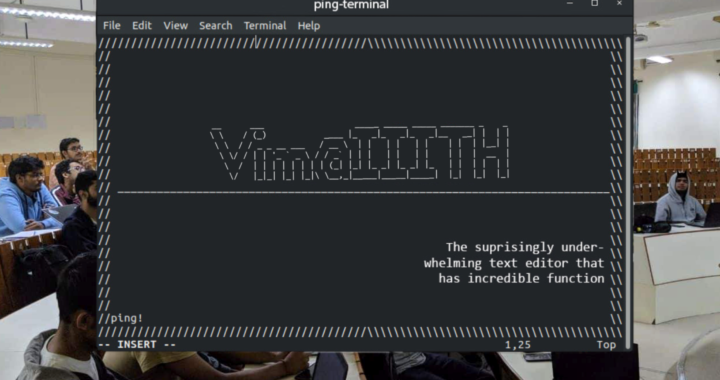 Vim Club has its first session !
Vim Club has its first session !  Hyderabad’s Water Shortage
Hyderabad’s Water Shortage  Interhouse Cricket Matches Underway
Interhouse Cricket Matches Underway 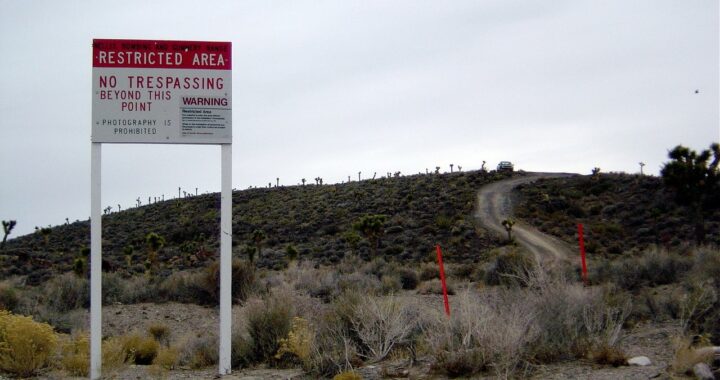 IIIT’s Area 51 Raid
IIIT’s Area 51 Raid 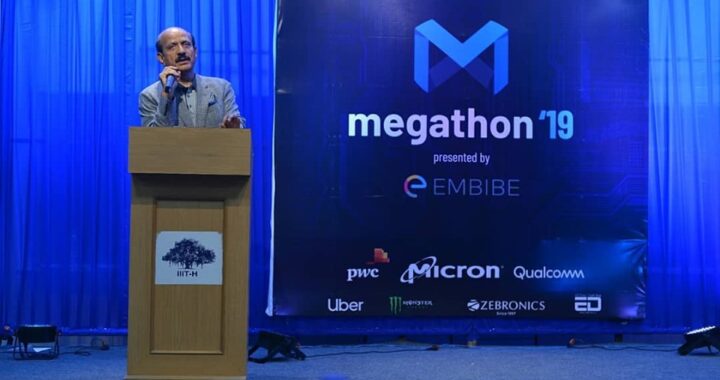 Megathon 2019
Megathon 2019  Cleaning up the Mess?
Cleaning up the Mess?  We Are So Cooked
We Are So Cooked 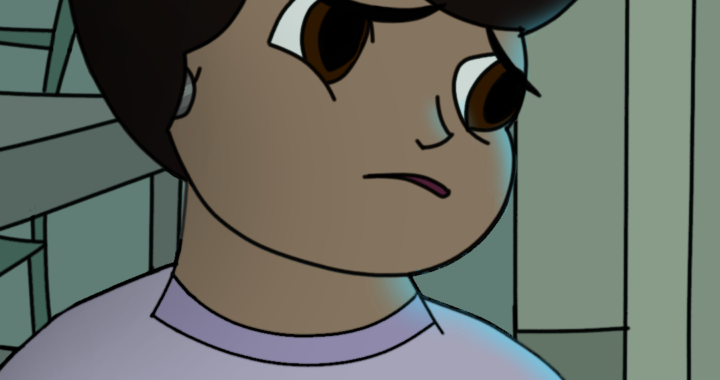 Qu’ils mangent de la grenouille! (Let Them Eat Frogs!)
Qu’ils mangent de la grenouille! (Let Them Eat Frogs!)